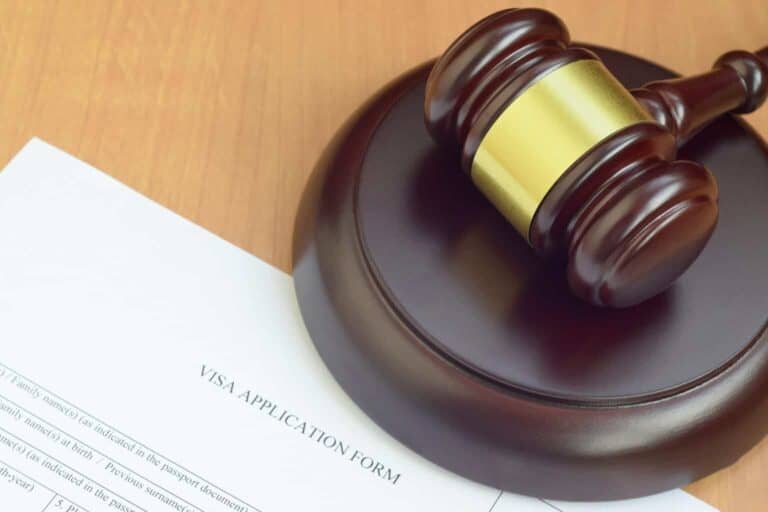NEW CHANGES ANNOUNCED TO AUSTRALIA’S PARTNER VISA PROGRAM
WHAT IS HAPPENING?
As of 24 November 2023, there is no longer a distinction between ‘onshore’ and ‘offshore’ Partner visa applicants for the purpose of granting the visa.
For context, there are two types of visa pathways under Australia’s Partner visa program:
- Onshore (subclass 820/801) visa application – for applicants who are in Australia at the time the application is lodged. These applicants must also be in Australia when the application is finalised.
- Offshore (subclass 309/100) visa application – for applicants who are outside Australia at the time the application is lodged. Up until now, these applicants also had to be outside Australia for the visa to be granted.
The new amendments to the Migration Regulations 1994 means that all Partner visa applicants can now be granted a visa regardless of whether they are inside or outside Australia at the time of decision. The changes apply to all visas granted on or after 24 November 2023, including those lodged prior to the changes being made.
The new changes have a particular impact on offshore Partner (subclass 309) visa applicants – that is, spouses and de-facto partners of Australian citizens, permanent residents and eligible New Zealand citizens (Australian sponsor) who are resident overseas, or otherwise lodged the application as an ‘offshore‘ applicant.
Under the new provisions, offshore Partner (subclass 309) visa applicants are no longer forced to remain outside, or physically leave Australia to meet the visa grant criteria. Similarly, onshore Partner (subclass 820) visa applicants no longer have to manage their travel movements to ensure that they are in Australia at time of decision.
The flow-on effect of the changes also mean that offshore Partner (subclass 309) visa applicants have direct access to Australia’s merits review process. Prior to the legislative amendments, these applicants were essentially excluded from the right to seek a review of a decision to refuse their application before the Administrative Appeals Tribunal (AAT), and had to rely on their Australian sponsor to initiate review proceedings on their behalf. The right to merits review is no longer limited to sponsors, and offshore Partner visa applicants now have access to the AAT in their own right.
The new changes do not impact the Prospective Marriage (subclass 300) visa program. Applicants for this visa must still be offshore (outside Australia) at the time a decision is made on their application.
WHY THESE CHANGES?
As a result of the COVID-19 pandemic and associated border closures, the government implemented a concession to the requirement for all offshore Partner (subclass 309) visa applicants to be outside Australia at time of decision. Without the concession, they could not legally meet the requirements for the visa to be granted whilst onshore. As the COVID-19 concession period ended on 25 November 2023, offshore Partner visa applicants who are in Australia would no longer be able to rely on the concession to remain onshore for the visa to be granted. The new amendment allows the concession to remain in place permanently.
In terms of review rights, the amendments have a significant impact on subclass 309 visa applicants:
- Partner visa applicants can find themselves in a very difficult situation when circumstances arise which threaten the continuation of a relationship relied upon for visa purposes. To avoid affected applicants from being disadvantaged, or otherwise forced to remain in dangerous relationships, the Department of Home Affairs extended special relationship cessation provisions in August 2022 to allow certain Partner visa applicants to still be eligible for the grant of the visa even though:
- Their sponsor died before a decision was made;
- The relationship ceased because of family violence committed by the sponsor; or,
- The relationship ceased and the applicant has custody rights to a child of the relationship.
- Prior to August 2022, the relationship cessation provisions were only available to offshore Partner (subclass 309) visa holders, and onshore Partner (subclass 820) visa applicants and visa holders. As of this date, the provisions were extended to include offshore Partner (subclass 309) visa applicants as well, but it was difficult to enforce in circumstances of a visa refusal as an offshore applicant
- As a general proposition under Australia’s immigration laws, ‘offshore’ applicants do not have an automatic right of review before an Australian administrative appeals body in respect of an adverse decision made on a visa application. There is an exception in circumstances where a sponsorship element exists between an applicant and an individual or organisation in Australia, in which case an appeal may be initiated by the Australian party on the applicant’s behalf.
- By virtue of the previous legislation still mandating ‘offshore’ time of decision criteria, offshore Partner (subclass 309) visa applicants were automatically denied review rights and subsequently forced to rely on their Australian sponsor to instigate an appeal before the AAT. This also meant that they could not easily access the special relationship cessation provisions introduced in August 2022.
This position has changes under the new legislative amendments which give subclass 309 visa applicants, especially vulnerable applicants, greater protection, and a direct avenue of appeal on par with their counterparts. While protracted merits review processes still pose a drawback for many applicants waiting offshore, the changes are certainly a positive step forward for the offshore partner visa program.
IMPACT OF THE CHANGES?
We welcome these very sensible amendments to the Regulations which benefit subclass 309 visa applicants who are currently in Australia. It is yet to be seen whether the Department’s policy provisions will reflect these changes to accommodate the challenges faced by applicants who are currently awaiting a decision outside Australia, particularly applicants from ‘high risk’ countries:
- Before the amendments, offshore Partner (subclass 309) visa applicants generally relied on a Visitor/Tourist visa to enter Australia while they waited for the partner visa to be finalised. An essential element of a visitor visa application is the need to demonstrate a genuine intention to stay in Australia temporarily by providing evidence of an incentive to return to one’s home country. While policy always allowed decision-makers to take a more lenient approach to this requirement on the basis that offshore Partner (subclass 309) visa applicants had to be offshore to facilitate a visa grant (and therein lies the incentive to depart), it is yet to be seen how the Department will approach this requirement in light of the new changes. To allow a pending subclass 309 visa applicant to travel to Australia on a tourist visa in circumstances where there is no need to depart the country to facilitate a visa grant, would essentially contradict the purpose of the tourist visa itself, but also impact meeting the ‘genuine temporary entrant’ criterion for the grant of the tourist/visitor visa as stipulated under the Regulations.
- Further to the above, while offshore Partner (subclass 309) visa applicants now technically have a right to be reunited with their Australian sponsor in Australia while they await a decision on their visa application, the legislative amendments do not appear to impact any bridging visa entitlements:
Under the Regulations, a person who is outside Australia can still apply for a bridging visa in Australia when certain conditions are met – specifically, if they hold a valid visa while they are outside Australia when they make an application for another substantive visa that can be lodged in Australia (includes internet applications made offshore) and granted in Australia.
Since an onshore lodgement can only result in the submission of a Partner (subclass 820) visa, an applicant cannot validly make a Partner (subclass 309) visa application while onshore in Australia. Consequently, they are not entitled to apply for a bridging visa if they travel to Australia following an offshore lodgement. Without a valid visa to enter or remain in Australia for a sufficient period of time, these applicants cannot practically remain in Australia to benefit from the new changes.
It may be the case that we will see a change in the partner visa program in future, which eliminates any distinction between onshore and offshore partner visa applications. This would be consistent with many other visa subclasses which no longer require applicants to be in a specific location at time of application or decision. Further, the changes have broader implications in other areas of government, including Australia’s Medicare system, which requires only evidence that a partner visa application has been made for enrolment purposes. While offshore 309 visa applicants could always enrol with Medicare on this basis, the new changes will likely result in an increase of enrolments.
ANY QUESTIONS?
If you, or anyone you know are impacted by the changes and wish to consider their options – particularly if they lodged an offshore Partner (subclass 309) visa application and currently remain outside Australia – please contact our team for further assistance and advice.
Relationship cessation provisions, particularly relating to applicants impacted by family violence, are often overlooked due to the limited understanding of what constitutes ‘family violence’. If you, or a family member has been impacted by family violence as a current visa applicant or visa holder, we strongly recommend seeking legal advice as soon possible. In the case of a visa refusal, it is critical to act fast, as a merits review application before the AAT must be made within 21 days of a decision being made and this timeframe cannot be extended under law. The only recourse would then be to institute court proceedings.
If you are concerned about the impact of the new changes on your tourist/visitor visa application while your subclass 309 visa is pending, the team at RCR Lawyers can provide knowledgeable support in guiding your steps in a shifting legal landscape.
Please contact Roxy Topham, Special Counsel and Head of Migration Services and Shadi Golchin, Solicitor of Migration Services at RCR Lawyers who would be happy to assist you with any immigration-related enquiries:
by email at [email protected] or call 07 3009 8444



